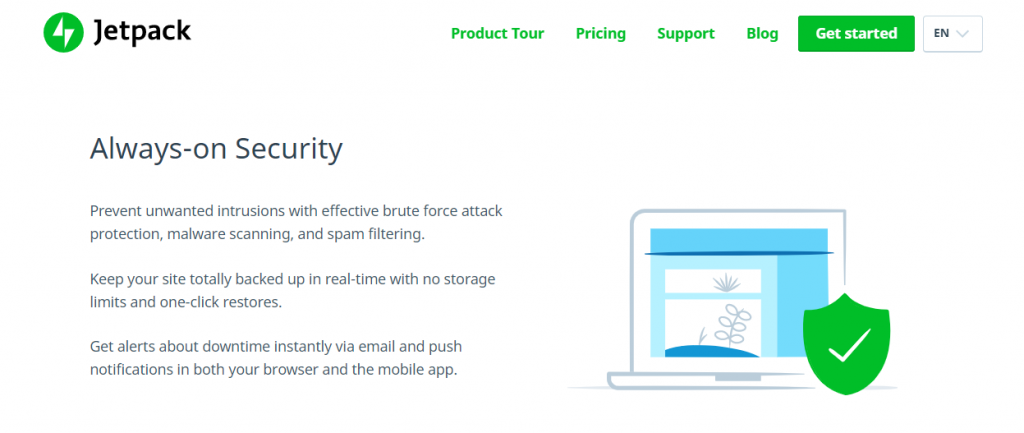Last updated - August 18, 2022
Nowadays, everyone wants to sell something online. It has become relatively simple, fast, and cheap to create an eCommerce website, and many rush into the e-commerce business without understanding the security aspects of the business. Â
In this article, you’ll learn what cyber security really is, why it’s vital for the survival of an eCommerce business, and the importance of Confidentiality, Integrity and Availability (the CIA triad) and DevSecOps concepts for e-commerce security.
What Is Cyber Security?
Cyber security is the application of security practices and technological tools, within the security perimeter of your digital assets. The goal is to protect systems, applications, devices, and network from cyber attacks.Â
What Is a Cyber Attack?
A cyber attack is instigated by threat actors—also known as hackers or cyber criminals—for the purpose of “hacking into†or “breaking through†the security perimeter.Â


Once a threat actor breach the security perimeter, they will gain a certain level of capabilities within the cyberspace. The level of access they gain will determine the damage they’ll be able to create, including exposing, altering, destroying, and stealing digital assets and data.Â
The Implications of Cyber Attacks on eCommerce
Let us look at some of the implications of cyber attacks on an online store.
Consumers Expect Secure eCommerce
eCommerce owners, managers, and admins enter a contract with their customers. On the outer level, there’s the promises of a brand, which requires e-commerce businesses to balance customers’ demands and expectations with the reality of operating a business.Â
Each eCommerce business has its own way of delivering on their promise to the customer, and that it’s a significant aspect of what makes each business unique. However, there is one promise that should not be taken lightly—the security of customers’ data.


Customers of e-commerce expect their shopping platform of choice to be secure. Otherwise, customers will go elsewhere. In today’s consumer-centric world, there’s a huge variety of eCommerce platforms to choose from. If one e-commerce platform doesn’t deliver, a secure platform is only a click away. You can always rely on tools like Jetpack to ensure security of your site.
Meeting Private Data Compliance Standards (GDPR)
The EU General Data Protection Regulation (GDPR) is a regulatory act governed by European law. The GDPR protects the private and sensitive data of European citizens. The GDPR applies to you even if a European so much as visits your e-commerce site. They don’t need to make a purchase, but if you store, track, and analyze user data, you’ll need to comply or expect a fine. You can always ensure you are using GDPR compliant plugins on your store.


Read more about WooCommerce GDPR here.
Meeting Financial Data Compliance Standards (PCI DSS)
The Payment Card Industry Data Security Standard (PCI DSS) is an Information Security (InfoSec) standard created and maintained by leading credit card companies. The PCI DSS protects the financial information of credit card holders. The PCI DSS applies to any site that processes credit card information. Failure to comply with the PCI DSS can result in fines.
Data Breaches Lawsuits
If you fail to secure your e-commerce site, and the breach is discovered, you face legal implications. As a digital merchant, you’re entrusted with the information of your customers. That includes sensitive information—name, ID, residential information, passwords etc.—and financial information—credit card number, authentication code, and credit card security code.
Failing to protect the information of your customers may result not only in compliance fines, but also in lawsuits. Companies like Equifax and Capital One, who had a major breach, were hit with class action lawsuits. Equifax recently settled its lawsuit for $650 million, and the fate of Capital One had yet to be determined.
Behind the Scenes of Cyber Security—Whose Responsibility Is It?
In today’s chaotic—and often lawless cyberspace—if you’re not responsible for the cyber security of your digital realm, someone else will take charge of it. 99.99% of the cases, that someone would be a threat actor, happily enjoying the easy mark they’ve found in your eShop.
The Dark Side of Cyberspace—When Threat Actors Battle for Control
If or when a threat actor becomes responsible for your cyber security, you’re hacked. That doesn’t necessarily mean all is lost. If you catch the hack on time, you might survive. The first step towards remediation is awareness. Here are a few levels of cyber dangers you should keep an eye for:
- Vulnerabilities—flaws in the security perimeter, including software (pieces of code), hardware (physical components), and network components (the architecture that connects points within the network). Vulnerabilities can be a result of human error, or intentional sabotage.Â
This is the answer to the question “why you got hackedâ€.
- Exploits—methods of using vulnerabilities to hack security perimeters. Threat actors create, use, and deploy exploits as they attack. There are exploits for any type of vulnerabilities, including pieces of code (injections that alter the code), and malware and ransomware (malicious software that can corrupt your data or block your access).
This is the answer to the question “how you got hackedâ€.
- Threats—anything that has the potential to endanger the security perimeter. Unknown or unpatched (known but not fixed) vulnerabilities threaten the security perimeter. Potentially, a threat actor could exploit the vulnerability and breach your security.
This is the answer to the question “how likely are your to get hackedâ€.
Your Side of Cyberspace—How to Protect Your E-Commerce Site
Whether you have a team of cyber security experts guarding your site, or it’s just you guarding your digital fort, there’s always something you can do to protect your patch of digital land. Here are the three practices any cyber security operation should implement:
- Confidentiality—create, maintain, and keep rules and procedures that ensure the protection of sensitive information. At the most basic level, that means enforcing access and authorization measures that grant access only to authorized parties, and restrict access from unauthorized parties.Â
- Integrity—maintain the accuracy, reliability, and consistency of your data and systems through the application of security and data best practices. That means blocking threat actors attempts to corrupt, delete, or stealing data. Data Loss Prevention (DLP) practices and solutions can help you achieve this goal.
- Availability—ensure that authorized users always have access to required network components such as systems, platforms, websites, and web pages. That means preventing threat actors from initiating attacks that might cause system or power outages. These will result in downtimes, and prevent access to your website.
Together, these three practices make up the CIA triad, which is considered the foundation of cyber security. You can build on your CIA triad, adding as many cyber security practices tools as needed.Â
DevSecOps approach
Today, many organizations adopt the DevSecOps approach, which treats cyber security as a continual process. Ideally, the adoption of DevSecOps should help you keep your e-commerce website secure at all times. You will apply a cultural change that promotes a holistic approach to security.Â
After adopting DevSecOps, everyone, from non-techie employees, software developers, and security experts will be united under the common goal of protecting your e-commerce platform. Thus, you’ll have a round-the-cloud cyber security operation that keeps your network secure and your customers happy.
It’s a Wrap!
Cyber security is key to ensuring the survival of your e-commerce business. By keeping your website secure, you’ll ensure that:Â
- Your customers feel safe to spend money on your products
- Regulations entities are happy to let you process and/or store private and financial data
- You’ll reduce the risk of data breaches, and the lawsuits that might follow.Â
There are many ways to practice cyber security, so be sure to build a system that works for you. Start with the CIA triad, and build your way up to DevSecOps. And remember—threat actors will exploit any flaw in your security perimeter. Embrace responsibility over the cyber security operations of your cyberspace, and you’ll gain the power to protect what’s yours.
Also read about ways to protect online business from cyber threats.











